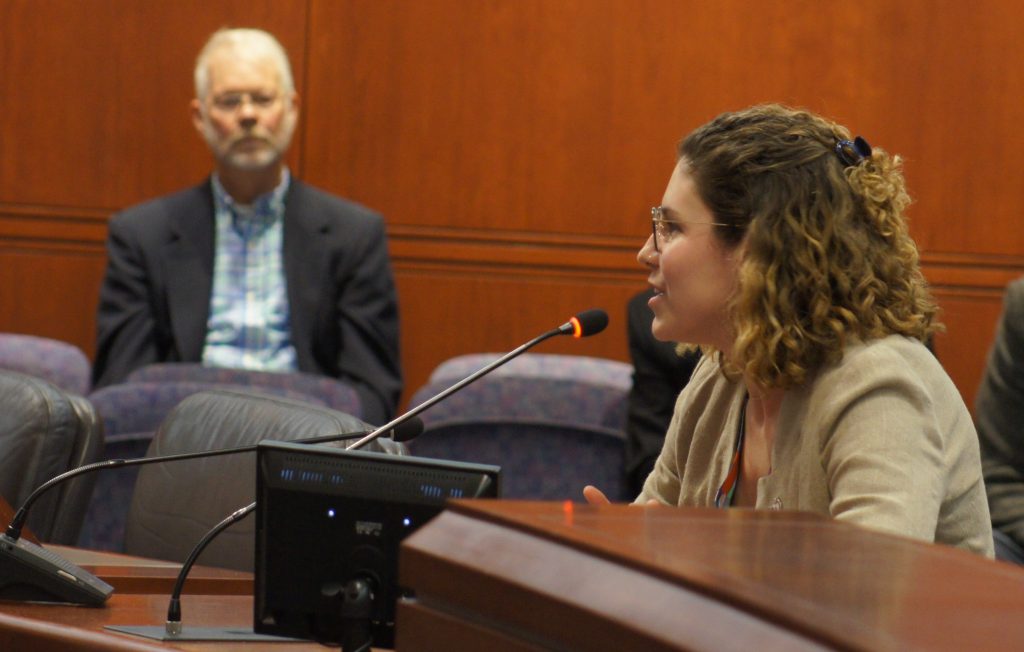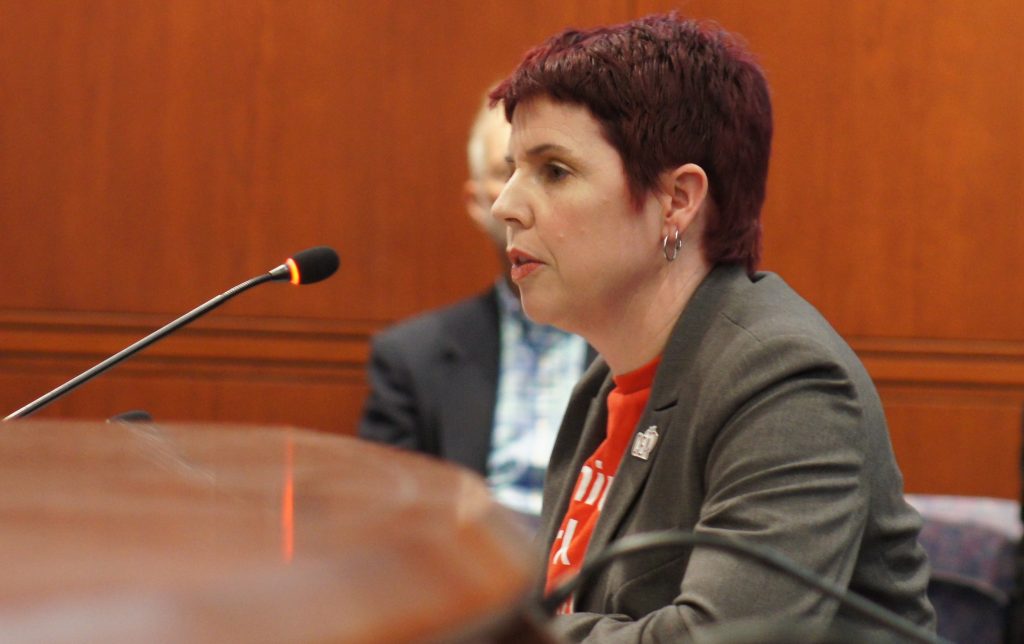“You quite literally just broke my heart.”
That was how Representative Jeff Currey responded to testimony from a CEA Aspiring Educator before the legislature’s Education Committee, which Currey co-chairs.
That preservice teacher, Gio Mason-Brooks, a student at CCSU (third from left), described being a first generation college student whose family has worked extremely hard to put him through college.
“Sometimes I feel I’m letting them down because of my career choice. My single parent, low-income household consists of myself and my mother, and I’m always trying to impress her. I fear that perhaps I made a mistake choosing education because it has such a low starting salary.”
Dozens of CEA members, leaders, and staff turned out in person and via Zoom yesterday to testify at a public hearing on bills before the legislature’s Education Committee–and hundreds more members submitted written testimony. Key proposals the committee is considering include those in Senate Bill 381: An Act Concerning the Teaching Profession and Revisions to the Mandated Reporter Requirements, which would raise teacher salaries, provide long-overdue hero pay for educators who worked through the COVID pandemic, change DCF mandated reporting requirements, update how members are elected to the Teachers’ Retirement Board, and more.
Speaking passionately about the need to raise starting salaries were teachers at every point in their careers.
$60K right away
Aspiring educator Veronica Reyes, a graduate student in UConn’s Neag teacher preparation program, applauded the bill’s establishment of a $60,000 minimum starting salary for certified teachers, noting her unpaid student teaching and $50,000 in student debt. Testifying virtually from the classroom where she is interning, the 22-year-old preservice teacher described working part-time weekend jobs during her clinical placements as well as three jobs over the summer to pay for rent, gas, and tuition. Inadequate pay, she pointed out, affects not only aspiring educators but also those with years of classroom experience.
“In my three clinical placements, I have seen each one of my cooperating teachers working extra jobs just to make ends meet for their families. Like me, these teachers have stayed at school well before and after their contractual hours to plan, prepare, and provide exceptional instruction. On top of having a heavy workload, certified teachers are severely underpaid, and most public schools I’ve been in are underresourced, which requires teachers to pay out of pocket for students’ school supplies and materials. As a student teacher, I have already put in my own funds to pay for science materials, behavioral incentives, and basic classroom essentials, like markers, without which my students would not be able to practice Fundations.”

West Hartford special education teacher Ellen Eickenhorst explained to the committee that teacher salaries have not kept up with inflation.
Ellen Eickenhorst, a West Hartford special education teacher, told the committee that, when she first considered a career in teaching back in 2013 as a college senior with student debt, beginning salaries for teachers seemed comparable to starting salaries for other jobs she looked at in non-profit organizations or sales.
“As a teacher though, I realized I could eventually make a higher salary with more experience and further education,” she said. “Back in 2013, a starting salary in West Hartford was $43,000. Ten years later, that number has crept to $46,000. Adjusted for inflation, that 2013 number is now $58,000. $58,000 is how much I made last year as a 10-year teacher with a master’s degree and three teaching certifications.”
Several preservice and early career educators noted that, while they love what they do, love is not enough to keep aspiring educators in teacher preparation programs.
“If only love paid the bills,” said former CEA Aspiring Educators Chair Kate Cummings, who completed her student teaching last year. “Teaching is such a demanding profession that requires long hours, emotional investment, monetary investment, and a high level of skill. As a student teacher, I gave those long hours and emotional and monetary investments, and while my bills did not go on pause for five months, I was not compensated for five months. I was struggling.”
Cummings, who took on a second job to avoid amassing more debt, noted, “Aspiring educators go from not being paid to having to supply their own classroom on a first year teacher’s salary. I encourage you to support this bill so that we can attract and retain the best and brightest.”

Granby teacher KC Petruzzi shared that low starting salaries make it exceedingly difficult to attract second-career educators to the profession.
Granby Education Association President KC Petruzzi noted that low starting salaries are also an obstacle for those interested in transitioning into teaching from other careers or military service.
“Our low starting salaries make it exceedingly difficult to attract second-career educators, an amazing resource for our students,” Petruzzi said. “In my district the starting salary this year is around $48,000, and those who are more experienced in my district can take up to 20 years to make the top pay. This varies from district to district greatly and has created a staffing problem for districts like mine that see people leaving for more money in the middle of their careers. We’ve turned over approximately a quarter of our certified educators in the last contract cycle. With the shortage of people entering the teaching workforce this problem has only gotten worse.”
“In the heart of the bustling inner city, I face the daily uphill battle of being a teacher in challenging circumstances,” said Bridgeport educator Elizabeth Fridinger, who called on legislators to ensure teachers are supported, respected, and well paid. “The lingering aftermath of the COVID epidemic has left both students and educators grappling with academic and social setbacks, amplifying the struggle. The lack of supplies in an inner city school has only added to the hurdles. Juggling the weight of my student loans, my status as a divorced single woman in an expensive society barely making ends meet, and the harsh reality of low pay, I walk into my classroom with determination etched across my face every day for my students, though I have thoughts of leaving teaching for a higher-paying career.”
CEA President Kate Dias told legislators that CEA strongly supports a minimum certified teacher salary of $60,000 and providing state funding to districts to allow local boards of education to meet that goal.
“Connecticut, like many other states throughout the country, faces a teacher shortage crisis as fewer young adults enter teacher preparation programs and worsening teaching conditions and lack of incentives push current teachers to leave for other fields or retire,” said CEA President Kate Dias. “The financial struggles educators face are a reality that we cannot ignore. In addition to working second and third jobs, it’s not uncommon for some early career educators to live with parents or other family members in order to get by while paying off immense student debt.”
Indeed, many Connecticut districts pay teachers less than $42,000 per year, with nearly half of beginning salaries falling below the income threshold to qualify for HUSKY B state assistance. As of this year, Connecticut has only one school district with a starting salary over $60,000.
“A minimum salary of $60,000 reflects a needed commitment to valuing and retaining the educated professionals who dedicate their lives to teaching the next generation,” said Dias. “By supporting this proposal, the legislature would uplift the profession and invest in a quality education for every child in Connecticut. It would be a signal to current and future educators that their work is valued and that our state prioritizes the wellbeing of those who educate our children.”
COVID hero pay
Teachers also told the Education Committee that the bill’s proposal to give a COVID credit of $1,000 to teachers who worked during the 2020 and 2021 school years would make educators feel seen and appreciated for the extraordinary commitment to their students they exhibited during the pandemic.

Bloomfield teacher Gail Jorden shows off one of the masks a music educator made so that her students could play their woodwind instruments at school during the pandemic.
“Teachers truly shifted gears. They did miraculous things,” Bloomfield Education Association President Gail Jorden said. “One teacher actually handmade masks for students to still be able to play their woodwind instruments. It took her 45 minutes for each mask, and she made over 100 of them. She deserves $1,000 at the bare minimum.”
CEA Treasurer Stephanie Wanzer, a special education teacher who works in an 18-22 transition classroom, explained how challenging it was to ensure that her students’ IEPs were properly implemented over Zoom. Her students, some of whom had trouble wearing masks, came back to the classroom for fall 2020, and parents worried about the spread of the virus at school.
“To have a parent ask you if their child would be safe going back to school–as an educator, that’s not something you ever want to imagine will be in question. If you want to affect change and improve the retention of special ed teachers, do the right thing for all educators who worked during the pandemic. Please consider the COVID credit as something that says, ‘We respect what you did,’” Wanzer said.
Bloomfield teacher Magnolia Coates taught preschool online during those first months after COVID closed schools–an incredibly difficult endeavor. Parents’ work hours and availability to help their children meant Coates and her colleagues were frequently working around the clock to support their students.
“Being a magnet school teacher, my students came from six different towns in Hartford County,” Coates said. “Some students had few supplies, toys, or books at home. I gathered toys and supplies from my classroom, disinfected them, packed them up, and dropped them on porches in six different towns.”
Once Coates was back teaching in person, her young students frequently didn’t understand why they needed to wear masks and would even trade masks with one another.
“The lack of hero pay is part of a pattern of not sufficiently valuing the teaching profession,” she said. “We should be compensated as others were who worked during the pandemic. A COVID credit would be a recognition that would show Connecticut honors and respects its education professionals, and it will assist in enticing new teachers to the profession.”
You can advocate to raise teachers’ salaries and provide hero pay to educators, as well as speak out on other education priorities, by coming to CEA’s Lobby Day at the State Capitol in April. Register today.







